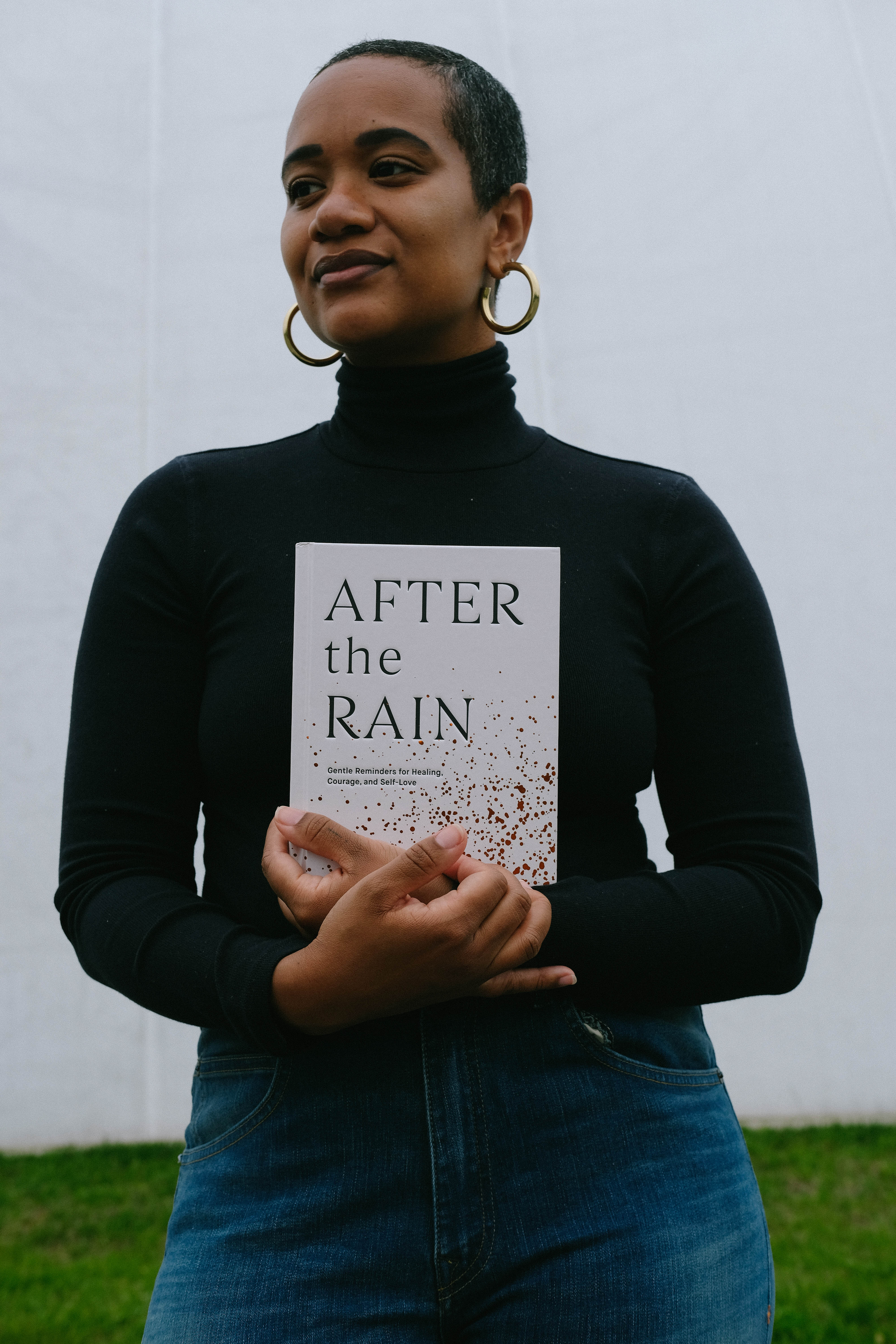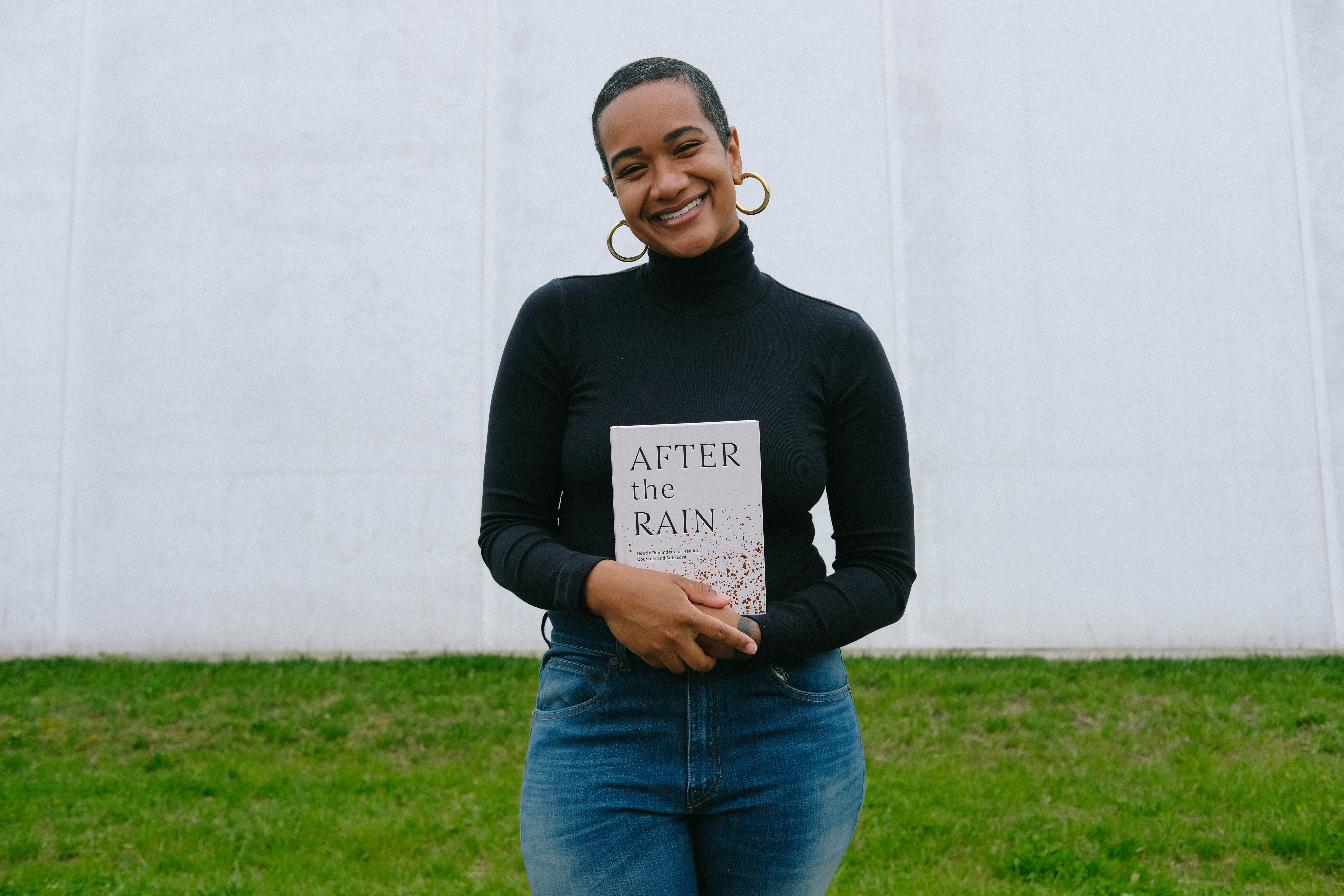
Source: Alex Elle / Ketchum
When we talk about Black women being unprotected, those famous words quoted from Malcolm X don’t only refer to a physical covering. From the time we’re girls, Black women are rarely shown compassion. Infrequently are we attempted to be understood, and hardly do we ever have the space to express the totality of who we are — fears, fierceness, flaws, and all.
In fact, it’s only in recent years Black women have been able to say, “I’m not okay,” or “I need help,” or “I have insecurities too.” For all of its shortcomings, social media is the medium that has become the great connector. And it’s writers like Alex Elle who’ve helped make it a space that shows Black women it’s okay to not be okay.
In 2012, Elle began sharing the post-it notes that have come to define her digital aesthetic on Instagram. In today’s world of branding, it probably seems Elle was ahead of the game, but the truth is “A Note to Self” was really a personal therapeutic exercise she decided to share publicly.
“I really was just trying to create community, but also give myself the space and the freedom to really affirm who I am, who I was growing to be, especially as a Black woman and as a Black mother, and trying to find this new inner language to support myself and what I call now my own self-care practice,” Elle explained. “I was just trying to be nice to myself.”
In 2013, at the urging of a friend, Elle self-published those notes in the book titled Words from a Wanderer, but she had no idea that would mark the beginning of her journey as a self-employed author and wellness consultant. It wasn’t until she started getting booked to teach journaling classes and speak to college students that she thought, “Oh, this could be something that sustains me and also fulfills me,” she shared.
Nearly a decade later, Elle has amassed a following of 850,000 on Instagram and has written three journals and three books with a fourth on the way. Seeing that growth and the way in which people latch on to her work has been “really grounding and supportive,” she said. “Everything I write is for myself first and foremost, and then it trickles down to being for my daughters and then it trickles down to everyone else so when I see that the words have resonated with someone or its given them a voice to express whatever they’re feeling on a deeper level it makes me feel really happy and supported and supportive. It really just shows how community matters and our language and our words and our stories matter.”
Ironically, writing for herself has been a key cornerstone of her community’s organic growth. I asked Elle how she’s been able to maintain the same authenticity and vulnerability as when she started out with nearly one million people reading her posts each day now and her answer was why not? “Like, why not show up as your full and true self and really embody what it means to be a flawed human with sh-t going on with them? That is really important to me,” she explained. “There’s enough of this idealized faux-perfection, especially on the Internet.”
That’s particularly true when it comes to Black women, who by and large, aren’t allowed to fail — or certainly don’t receive a lot of grace when they do. That’s why, in addition to her work being a part of her own self-care practice, it’s also a part of how she mothers. Elle said her approach when it comes to how she engages her platform is to ask, would I feel comfortable with my 12-year-old daughter seeing this? That goes beyond any consideration for language or adult content per say, which is the way most think about what’s appropriate for children. It’s about setting an example and showing her oldest girl that she is free to be who she is.
“Everything kind of works in tandem, but that’s a big part of it — showing up as my true self so that other people can have the permission to show up as their true self. Especially as a Black woman, I find that it’s my duty to be as vulnerable and as flawed and as open to learning and as honest as possible with what I’ve walked through and how I’m healing and what I’m learning because I don’t think we see enough of that. In our families, we see our aunties, our moms, our grandmothers holding it together, keeping the family afloat, just showing up even when they’re empty.
“So it’s like how do we shift that generational habit so that we take care of ourselves first so that we can show up in our community. So when I’m talking about self-care in my work, it’s not self-care just for Alex, it’s self-care as community care so I can show up as the wife, as the mother, as the friend, as the author, as the facilitator in my most intentional and authentic way and that requires showing up for myself. That also requires standing in my power and leaning on my truth. That is really important to give other people permission to do the same.”
Motherhood is one of the subjects Elle explores in her upcoming book, After the Rain, specifically her relationship with her own mother and how she chooses to raise her three daughters.

Source: Alex Elle / Ketchum
“I mother completely different and I think what really matters to me most is that my children are free to be children, that my children are free to make mistakes, that they know that they truly have a voice and that they trust me,” Elle said. “For me, raising daughters, raising Black daughters, I want to make sure they always have a mirror of compassion and of love at the end of the day, even for people who hurt us. Even for people who didn’t know any better, didn’t know how to show up and support us. A big thing in my house is we apologize to each other, the parents and the children included. I have a 12-year-old, a 2-year-old, and an almost 1-year-old. I know for a fact that making space for error and apology is so important and making sure that my children know that we see them and that no matter what they do they will never do anything to make us not love them.”
Sharing that she was raised in a very different environment, Elle said, “Love always felt kind of conditional” in her household where she was raised by a single mother –“like you be who I want you to be, you act how I want you to act, and if you don’t I don’t love you.” Though her mother never said she didn’t love her, her actions weren’t loving, Elle pointed out. Through her book, however, she and her mom have been able to heal some of those past wounds.
“When I wrote about our relationship in my new book, I gave her a copy first. I bookmarked the pages that were about our story and then we were able to have a conversation about mothering and about womanhood and about making space for not only seeing a person as their role in your life but seeing the person as a human with their own stuff going on and holding space for compassion and understanding, or even the attempt to understand even if you don’t understand.”
In all, After the Rain, which is part memoir, part journal guide, encompasses 15 lessons that encourage readers to ask the questions: “How do we hold space for the thing that hurt us and the joy that’s going to come after the rain? How do we really lean in and make space for both and? And how do we continue our practice of healing? I think healing is our birthright, especially as Black people,” Elle said. “People expect you to stay broken and that is not our testimony.”
The 31-year-old’s own life is a testament to that. “I was a young mom I had my first daughter when I was 18 under not the best circumstances, out of complete lack of self-love and searching for a void to be filled. Now, looking back, I can say I have always been love and I have always had the power to love myself. I just had to figure it out by myself. So it took me a little longer but it doesn’t mean it’s impossible.”
For many, the current pandemic is their rainy season, with unexpected torrential pours threatening to drown them under the incessant drizzle of uncertainty. Like everyone, Elle has been effected, not just by a loss of currency from not being able to hold retreats she’d had on the docket, but also the loss of connection. Having been pregnant all of 2019 while raising a newborn, Elle said she was looking forward to holding workshops again. “I was ready to get back to my community, to get back to teaching in front of people.” Thankfully, she’s been able to shift her offerings online and during the past three quarters, more than 3,000 people have signed for her writing courses. “I’ve been able to teach and connect on a whole new level that really shows that people need each other. And people want this work. They want to learn how to find their voice and know that they have their answers.”
Armed with a $15,000 Bounce Back Grant from Poise, gifted to women-owned businesses who are uplifting other women with their work, Elle is also positioned to begin communing with students again when it’s safe and bringing with her the lessons of purpose and harmony Covid-19 has taught her.
“What this is teaching me is create timeless work. Create work that people want and that people will grow from. Create legacy through your work. Create trust with folks. Really connect with them on a level that is authentic so that people trust you,” she said. “Yes, I am a business. I know that Alex Elle is a business but I also really take pride in what I’m offering to the world and I know that it’s going to outlive me. My books will outlive me and that is more than I could ever ask for as far as creating legacy that lasts.”
Preorder After the Rain here.









